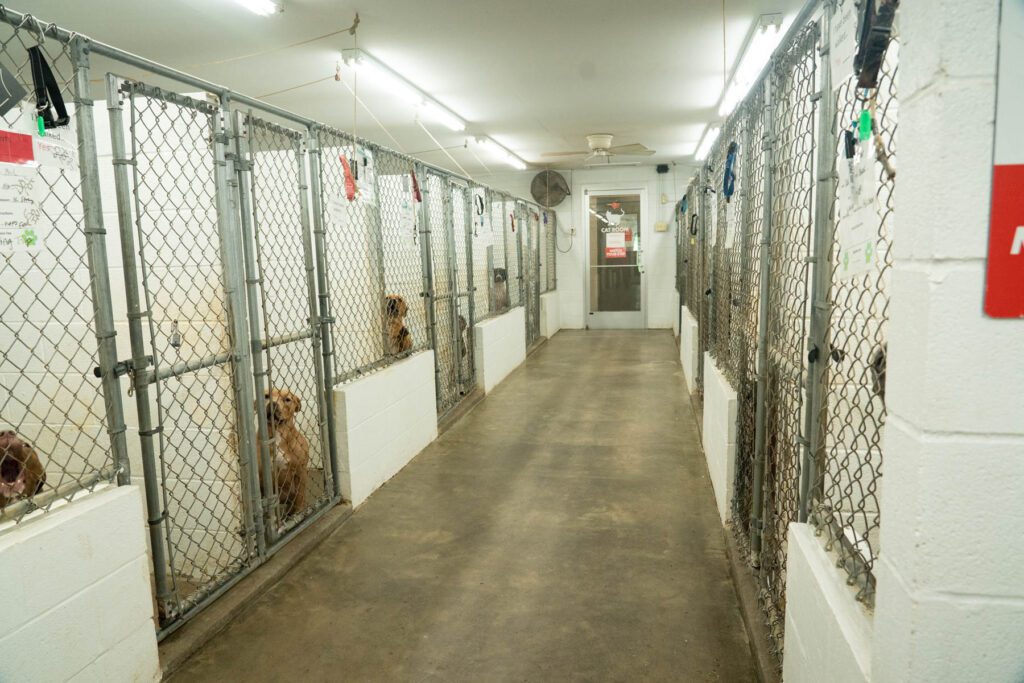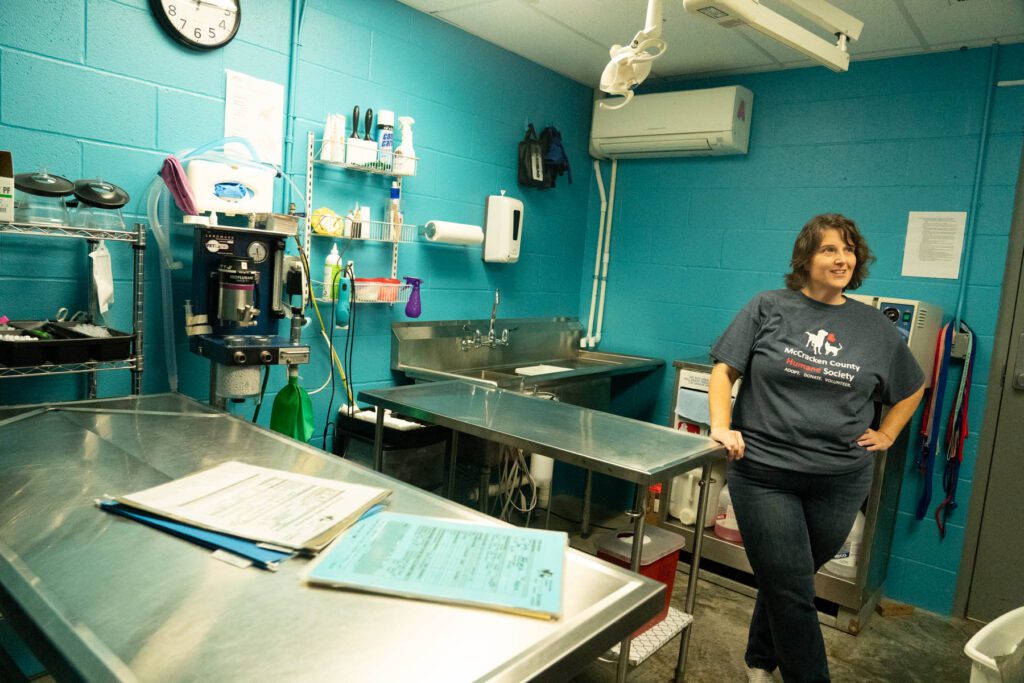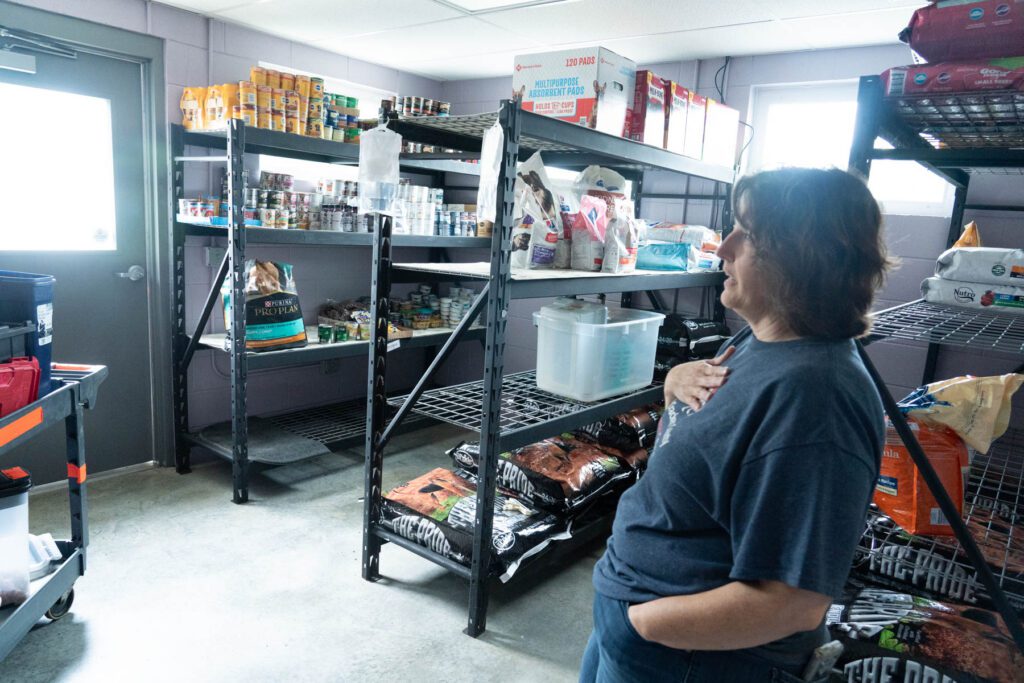It’s been said that you can’t solve a problem with the same mind that created it. Traci never wanted to be the director of McCracken Humane Society when she decided to leave her job as a social worker to scoop poop in the cat area. Her plan was to cuddle kitties and go home; she wanted a job that was less stressful and still produced a paycheck (if a significantly smaller one).


Two years later, she was running the place. Now it’s been another two years, and clearly, Traci was meant to do this job. She is smart, resourceful, and intentional in her decisions. When COVID forced the shelter to do adoptions on their front porch, she realized that bringing the animals out instead of letting people walk through the kennels was better for the animals, so she continued the practice.
Anyone who has ever walked through the kennel area of any shelter knows that the presence of a stranger sends the anxiety and excitement of the dogs over the top. Many dogs bark, jump, and lunge raising the stress level of everyone involved, human and canine. And other dogs cower and hide at the noise and the threat new people bring.





This is only the second shelter we’ve visited that doesn’t allow the public to walk through their kennel areas to look for a new pet. I hope more shelters embrace it.
Traci has been slowly reconfiguring the shelter’s areas to make it more efficient and better for the animals and the people. For instance, the cat area used to be behind the dog kennels. Every time a cat needed to be brought to the lobby or Meet and Greet area for potential adopters, it had to be carried through the dog kennels – a terrifying perp walk for any cat.

That meant the cat arrived in the lobby to meet a potential adopter upset and anxious (and the person carrying the cat might be sporting a few new scratches). The only other option was for the potential cat adopter to walk through the dog kennels, which was often intimidating for the person and stressful for the dogs.
Instead, Tracie moved the cat condos and enclosures to the lobby, and took over part of the Meet & Greet area. Now the cats get more socialization and people get to see them in a relaxed setting.
Like many shelters, McCracken has a tough history. Traci and the current staff were not part of that history, but they are continuing to overcome it. They do not kill animals for space at McCracken and they give dogs every possible chance, euthanizing only for extreme behavioral or medical necessity. That was not always the practice at the shelter.
The Humane Society is a nonprofit, but they have the animal control contract for the county, so they take the strays, bite holds, and court cases brought by the two ACOs for the county. There are currently 145 animals in the shelter (mostly dogs) and they are absolutely full and closed to intake. This is something that frustrates the public, not just in Paducah, but everywhere. Shelters are full and struggling to find ways to make room for more animals without euthanizing. Not every shelter is succeeding at that, but for the present moment, McCracken is.


Traci is trying to win over the public by taking the shelter animals out for festivals and events, and keeping adoptable cats at the PetSmart. They recently began hosting Reading Nights at the shelter in which they invite the library bookmobile to park outside, and kids to come to the shelter and read to the dogs.
The dogs love it and something very special happens when the aisles of the kennel area are filled with kids and parents sitting on blankets outside kennels reading—the dogs grow quiet.
McCracken is blessed to have an in-house veterinarian who handles the shelter’s vet work and spay/neuter surgeries, but Traci dreams of opening a clinic on the open space next to the shelter. There is a veterinary shortage in the area (and much of the south) and it is expensive and difficult for the public to get spay/neuter surgeries. She’d like the shelter to be able to create a place that can serve the public’s spay/neuter needs also.

All the animals that are adopted from McCracken Humane Society are spayed/neutered, up to date on shots, micro-chipped, and healthy. They have reasonable adoption fees, but discount dogs who have been there longer. The average stay currently is 115 days. That’s a long time, but the few rescue partners they have are full and not taking dogs. We’ve heard about this same log jam everywhere we travel this past year. It’s a tough time in sheltering.
I hope this is a ‘lump in the snake’ that we just have to get through before things will improve, but for right now, shelters need leaders like Traci who are creative and think outside the box to find solutions.
McCracken tries to offer food and other assistance to keep people from surrendering pets, but that is getting harder for them to do as donations have slowed significantly.

If you’d like to help them refill their supplies, you can shop their Amazon wishlist or Chewy wishlist.
If you’d like to donate, you can find lots of ways to do that through the donation page on their website.
All of our stops in Kentucky were inspiring, primarily because of the remarkable leaders who are guiding their shelters through this very tough season of sheltering.
We’d love for you to support us as we gear up for another shelter tour by registering and bidding during our online auction this September. It’s our biggest fundraiser of the year and is chock-full of great stuff!

Until each one has a home,
Cara
If you want to learn more, be sure to subscribe to this blog. And help us spread the word by sharing this post with others. Visit our website to learn more.
You can also help raise awareness by following/commenting/sharing us on Facebook, Instagram, YouTube, Tik Tok, and the Who Will Let the Dogs Out podcast.

Learn more about what is happening in our southern shelters and rescues in the book, One Hundred Dogs & Counting: One Woman, Ten Thousand Miles, and a Journey Into the Heart of Shelters and Rescues (Pegasus Books, 2020). It’s the story of a challenging foster dog who inspired me to travel south to find out where all the dogs were coming from. It tells the story of how Who Will Let the Dogs Out began. Find it anywhere books are sold. A portion of the proceeds of every book sold go to help unwanted animals in the south.
For more information on any of our projects, to talk about rescue in your neck of the woods, or become a WWLDO volunteer, please email whowillletthedogsout@gmail.com or carasueachterberg@gmail.com.
And for links to everything WWLDO check out our Linktree.



Leave a Comment
Sign up for our newsletter
Sign up to have our latest news, grant updates, shelter visits, and more delivered to your inbox.
Share this:
Like this: